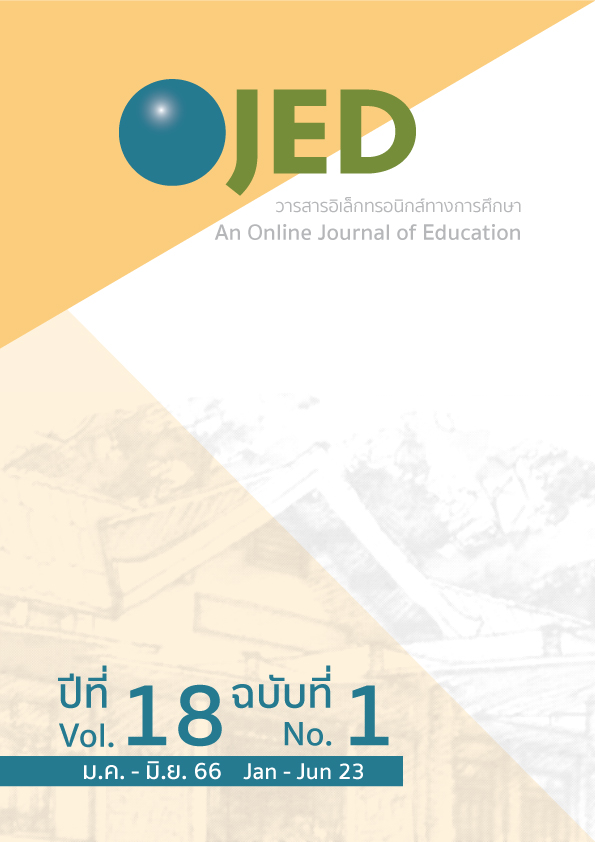Guidelines for Integrating Creative Movement : A Case Study of Private School
DOI:
https://doi.org/10.14456/ojed.2023.9Keywords:
guideline, integration, creative movement activity, kindergarten classroomAbstract
The primary aim of this research was to explore the strategies employed by kindergarten teachers in the integration of creative movement within their classroom settings. The study focused on a sample of 36 kindergarten teachers at Jitmhetta Kindergarten Classroom (Pseudonym), a private school, and utilized a questionnaire as the primary research instrument. The data collected through the questionnaire was analyzed using statistical techniques, such as frequency distribution, percentages, and content analysis.
The findings of the study indicated that the successful incorporation of creative movement in the classroom was contingent upon the teachers' knowledge, creativity, and willingness to include movement in their lessons. The study proposed two key approaches: firstly, the planning and implementation of sequential activities with clear objectives and appropriate movement media, such as song, rhythm, and rhymes while ensuring the safety and suitability of movements within the classroom space. Secondly, the organization of group activities that encourage children to engage in free movement, characterized by clear rhythms aligned with learning objectives, followed by calming activities that involve stretching and relaxation.
These approaches have the potential to enhance children's physical and emotional development, as well as cultivate a positive classroom environment.
References
ภาษาไทย
กรองทอง บุญประคอง. (2563). แนะนำโรงเรียน. https://www.rakluke.com/learning-all/school/item/2020-03-21-13-17-47-2.html
ณภคกร เจะเลาะ. (2563). การจัดประสบการณ์การเรียนรู้โดยใช้ชุดกิจกรรมเคลื่อนไหวและจังหวะ เพื่อพัฒนาลักษณะความเป็นผู้นำในเด็กปฐมวัยชั้นอนุบาลปีที่ 3. Journal of Educational Technology and Communications Faculty of Education Mahasarakham University, 13(18), 55-67.
ณัชชา เตชะอาภรณ์ชัย. (2560). การจัดกิจกรรมการเคลื่อนไหวประกอบบทเพลงพื้นเมืองสำหรับเด็กปฐมวัยที่มีต่อความเข้าใจจังหวะ. วารสารสถาบันวัฒนธรรมและศิลปะ, 18(2), 36-42.
ธีรพงศ์ เจริญนาค. (2563). ผลของการฝึกการเคลื่อนไหวร่างกายและการเล่นอย่างสร้างสรรค์ที่มีต่อความแม่นยำในการขว้างบอลของเด็กปฐมวัย. วารสารการวัดผลการศึกษา, 37(101), 73-87.
พรพิมล เวสสวัสดิ์. (2558). ผลของการจัดกิจกรรมเคลื่อนไหวและจังหวะโดยใช้แนวคิดการเต้นเชิงสร้างสรรค์ที่มีต่อความคิดสร้างสรรค์ของเด็กอนุบาล. วารสารอิเล็กทรอนิกส์ทางการศึกษา, 10(2), 63-73.
ศิริพันธ์ บุญญานุสนธิ์. (2561). แนวทางการเสริมสร้างสมรรถนะการจัดกิจกรรมการเรียนรู้ของครูผู้ดูแลเด็กศูนย์พัฒนาเด็กเล็กสังกัดองค์กรปกครองส่วนท้องถิ่นในเขตอีสานใต้. วารสารรมยสาร, 16(1), 259-272.
สำนักงานเลขาธิการสภาการศึกษา. (2560). แผนการศึกษาแห่งชาติ พ.ศ. 2560 – 2579. กระทรวงศึกษาธิการ.
สุภาวดี หาญเมธี. (2564). ความรู้ฐานราก 3 มิติในการพัฒนาเด็กและเยาวชน. https://rb.gy/osyoa
ภาษาอังกฤษ
Andrews, N. A. (1982). The Orff-Schulwerk approach to movement and music. Journal of Physical Education, Recreation & Dance, 53(1), 76–77. https://doi.org/10.1080/07303084.1982.10629292
Cohea, K. (2019, April 10). 5 Steps to make your creative movement classes a breeze! Different drummer dance. https://www.differentdrummerdance.com/blog/5-steps-to-make-creative-movement-a-breeze
Dow, C. B. (2010). The power of creative dance. Young Children, 31-35.
Hardiman, K. (2017, September 18). Creative movement: Guidelines for effective teaching. AOK Music and Arts. http://aokmusicandarts.com/dance/2017/11/7/creative-movement-guidelines-for-effective-teaching
Jin, M., & Moran, M. J. (2021). Chinese and US Preschool Teachers’ Beliefs About Children’s Cooperative Problem-Solving During Play. Journal of Early Childhood Education, 49, 503-513.
Langton, T. W. (2007). Applying Laban’s movement framework in elementary physical education. Journal of Physical Education, Recreation & Dance, 78(1), 17–53. https://doi.org/10.1080/07303084.2007.10597954
Muhamad, J., Razali, M., & Adnan, YM. R. A. N. R. (2017). Needs and criteria in developing creative movement module for preschool children. Human Resource Management Academic Research Society, International Journal of Academic Research in Business and Social Sciences, 7(2), 570-581. https://ideas.repec.org/a/hur/ijarbs/v7y2017i2p570-581.html
Newman, J., & Feinberg, M. (2015). Move to learn: Integrating movement into the early childhood classroom. Gryphon House.
Penfold, L. (2021, January 3). How to teach creative movement to children. Cultivating Children's Creativity Through Art. http://www.louisapenfold.com/creative-movement-young-children/
Thomas, J., W. (2011). Creativity through music and movement. Illionois Music Educator. 72, 98-99.
Downloads
Published
How to Cite
Issue
Section
License
Copyright (c) 2023 An Online Journal of Education

This work is licensed under a Creative Commons Attribution-NonCommercial-NoDerivatives 4.0 International License.




